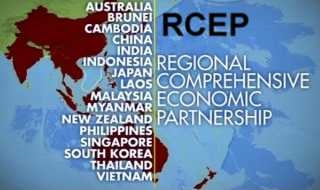RCEP participating countries call for swift conclusion of negotiations

ICTSD | 10 November 2016
RCEP participating countries call for swift conclusion of negotiations
Negotiations for the 16-country Regional Comprehensive Economic Partnership (RCEP) are increasingly making progress towards crafting a future trade and investment deal, officials say, though whether talks will be concluded this year as previously envisioned is less clear.
The proposed RCEP agreement, for which negotiations commenced in 2012, includes 16 economies in the Asia-Pacific, comprising almost half of the global population and a third of the world’s GDP. The scope of the free trade agreement covers goods, services, and investment, as well as competition, intellectual property rights, and dispute settlement.
RCEP ministers held an Intersessional Ministerial Meeting in Cebu, Philippines, from 3-4 November, reviewing the progress made to date along with what steps may be needed to conclude the deal in the near term.
The joint statement issued by the ministers at the meeting’s close highlighted challenges facing the global economy, including slow projected growth in world trade – where the WTO figures were recently revised downward – and creeping protectionist sentiments.
They also directed their negotiators to ramp up their work in goods and services trade, as well as investment. However, the statement omits any mention of when the group is aiming to conclude the talks.
“The ministers, therefore, underscored the urgency of a swift conclusion of the RCEP negotiations as a single undertaking, which will provide a much needed boost to confidence for the global economy,” said the statement.
The most recent negotiating round, held in Tianjin, China, from 17-21 October, focused on delineating market access on trade in goods, services, and investment, as well as on rules of origin, intellectual property, competition, and e-commerce. The chapter on economic and technical cooperation was concluded, which ministers said was a promising development that could inject additional momentum for talks and help address development gaps among RCEP members.
APEC leaders to meet at the end of the month
The final RCEP negotiating round scheduled for 2016 will be held in December in Indonesia. It was not yet clear at press time whether and when they might be holding additional rounds in 2017.
However, the RCEP’s progress and prospects will likely be an area for discussion at an upcoming meeting of regional leaders later this month. The Asia-Pacific Economic Cooperation (APEC) Leaders’ Meeting will be held on 20 November in the Peruvian city of Lima, bringing together heads of government from 21 countries in the Asia-Pacific region, including Australia, Canada, Chile, China, Japan, Mexico, Russia, South Korea, and the US.
Boosting intra-regional trade has long been a high-profile topic of the APEC leaders’ meets, particularly as various different models for such regional integration have emerged over the years. The most high-profile have been the RCEP as well as the Trans-Pacific Partnership (TPP). While the two share some overlaps in membership, there are some significant differences. Most notably, the US is part of the TPP, but not RCEP. Meanwhile, China, India, and South Korea are in RCEP but not the TPP.
As in previous years, US President Barack Obama is expected to meet with fellow TPP leaders on the sidelines of the APEC gathering. The proposed trade accord is currently pending ratification by domestic legislatures, with countries such as Australia, Japan, and New Zealand currently working to push it through their respective approval procedures. (See Bridges Weekly, 7 September 2016 and 3 November 2016)
“The President will focus on his continued efforts to make the case to Congress and the American people for approval of TPP without further delay,” according to a White House statement issued last month.
However, whether this can be done before a new president takes office in January remains to be seen, with the post-election prospects for TPP looking increasingly grim following the shock victory of Republican candidate Donald Trump on Wednesday.





